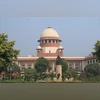A PIL filed in the Supreme Court on Thursday sought to scrap the TDS system calling it "arbitrary and irrational" and violative of various fundamental rights, including equality.
The PIL challenged the tax deducted at source or TDS framework under the Income Tax Act, which mandates the deduction of tax at the time of payment by the payer and its deposit with the income tax department. The deducted amount is adjusted against the payee's tax liability.
The plea filed by lawyer Ashwini Upadhyay through advocate Ashwani Dubey, made the Centre, ministry of law and justice, law commission, and NITI Aayog as parties.
It sought a direction to "declare the TDS system manifestly arbitrary, irrational and against Articles 14 (right to equality), 19 (right to practice profession) and 21 (right to life and personal liberty) of the Constitution, hence void and inoperative".
The plea further sought directions to the NITI Ayog to consider contentions raised in the plea and suggest necessary changes in TDS system.
Also Read
It said the law commission should examine the legality of the TDS system and prepare a report within three months.
The TDS system imposes significant administrative and financial burdens on taxpayers tasked with compliance which include managing complex rules, issuing TDS certificates, filing returns, and defending against penalties for inadvertent errors, argued the plea.
Assessees often incur substantial expenses, ranging from salaries of compliance staff to professional fees for tax consultants, without receiving compensation, it said.
The plea said the system violated Article 14 (equality before the law) by disproportionately burdening economically weaker sections and small earners who lack the capacity to navigate its technical requirements.
Referring to Article 23, it said the imposition of tax collection duties on private citizens amounted to forced labour.
The TDS system was stated to adversely affect individuals below the taxable income threshold, as tax was deducted at source irrespective of their liability.
"The regulatory and procedural framework surrounding TDS is excessively technical, often requiring specialised legal and financial expertise, which most assessees lack. The result is an unjust shifting of sovereign responsibilities from the government to private citizens without adequate compensation, resources, or legal safeguards," it said.
(Only the headline and picture of this report may have been reworked by the Business Standard staff; the rest of the content is auto-generated from a syndicated feed.)

)